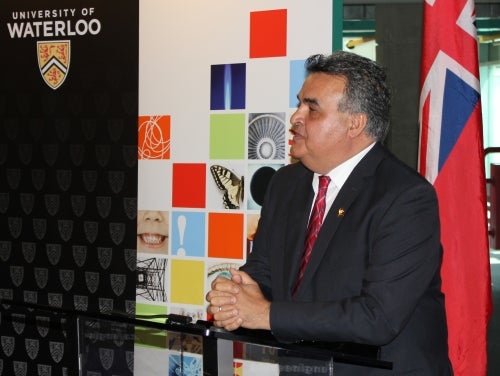Engineering researchers at the University of Waterloo are working with Ciena to find solutions to help network operators and service providers respond to the insatiable demand for faster and faster data transmission over the Internet.
A key area of Waterloo’s partnership with the network strategy and technology company involves squeezing as much capacity as possible out of fibre optic cables that run under the world’s oceans and handle upwards of 95 per cent of all intercontinental communications, including $10 trillion a day in financial transactions.

Stephen Alexander, Senior Vice President and Chief Technology Officer of Ciena, speaks during the announcement today of a research partnership with Waterloo Engineering.
The research relationship, which was announced during an event at the University today, is also supported by the federal government through the Natural Sciences and Engineering Research Council of Canada (NSERC).
The reliable, high-speed transmission of vast amounts of information via undersea cables is increasingly important in fields including healthcare and academic research, as well as for consumers who expect quality high-speed Internet service on their cellphones.
“The thirst for additional bandwidth and capacity is unquenchable,” said Rodney Wilson, Senior Director for External Research at Ciena. “It’s a battle of tiny, tiny increments. When you add them all up, it creates market-leading innovations.”

Read the full story.